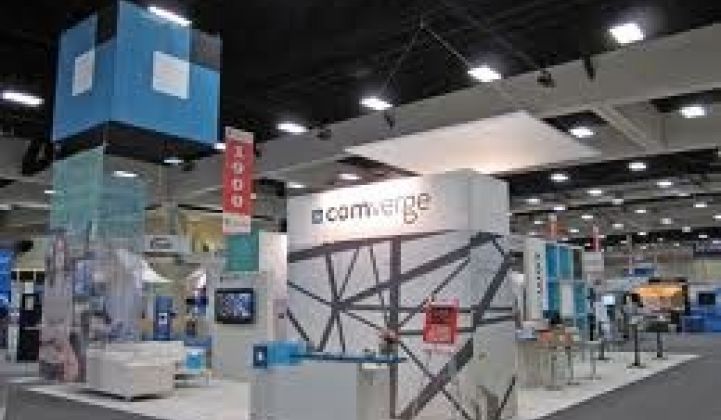Demand response company Comverge dropped some bad news into its 2011 fourth-quarter and annual earnings report Thursday, reporting that it is actively exploring financing options, including the sale of the company, to fund continuing operations.
Comverge reported a 2011 loss of $12.8 million, compared to a loss of $31.4 million in 2010, in an announcement made after market close Thursday. The Norcross, Ga.-based company hasn’t shown an annual profit since it went public in April 2007, so that’s not surprising -- but its short-term money problems are.
Indeed, Comverge’s 10-K filed Thursday warns that “due to the combination of the amount of cash flow that is expected from operations, debt that is due in 2012, and the restrictive debt covenants with which it may not comply, there is substantial doubt about the Company's ability to continue as a going concern.”
To cope, the company is “actively exploring all financing options including restructuring of its current credit facilities in the near term or the possible sale of the company,” Comverge’s filing warned. The company plans to hold a conference call on its quarterly and annual results on Friday, March 16 at 9 a.m. Eastern time.
CEO R. Blake Young struck a positive note in a prepared statement, saying that the company’s board and management are “working diligently on strategic alternatives for obtaining the required capital and financing.” That includes making sales of stock to Aspire Capital Fund under an agreement the two reached in November.
But covenants with its creditors may worsen the picture, Comverge warned. For example, lender Grace Bay has written Comverge letters alleging the company is in default on its loan because it didn’t meet revenue targets contained in the covenant in the fourth quarter, the company reported. Another lender, Silicon Valley Bank, has the right to restrict access to its credit facility if Comverge’s unrestricted cash falls below $20 million, the company reported.
As of Dec. 31, 2011, Comverge had $23.1 million in working capital and $17.1 million in long-term debt. If it goes below SVB’s $20 million trigger, anything Comverge owes SVB in excess of its reduced borrowing capacity will become immediately due and payable, the company reported. Failing to pay it could trigger a default, leading to cross-default in other borrowing arrangements that could bring all its outstanding debt due and payable.
Comverge had an accumulated deficit of $228.8 million and stockholders equity of just $37 million as of the end of 2011. The company has financed operations and capital expenditures through the sale of our securities and by borrowing money for the past several years, it stated.
Comverge projected 2012 revenues of $145 to $170 million in its Thursday announcement. While the company has said it is on track for profitability in 2012 or 2013, investors don’t seem sanguine -- the company’s share price has fallen from around $7 in early 2011 to trade below $2 since October.
The company has been adding customers in the past few months, including utilities and companies in Pennsylvania, as well as a project with South African utility Eskom. On Thursday it announced another project with 80,000-member New Hampshire Electric Co-Op to connect smart meters from Elster into Comverge’s IntelliSOURCE demand response platform.
Comverge’s key competitor, Boston-based demand response provider EnerNOC, held its IPO in May 2007, one month after Comverge did, and the two companies seemed to grow at roughly equal rates for the first few years after their public debuts.
But in the past few years, EnerNOC has jumped ahead of its rival in terms of its market, clocking in more than 7,000 megawatts under management as of late last year, compared to Comverge’s 4,564 megawatts under management.
EnerNOC, for its part, has seen its share price suffer under an ongoing dispute with key customer PJM, and last month reported a 2011 loss of $13.4 million compared to a $9.6 million profit in 2010. But it’s also been adding customers at a rapid clip, as well as buying up lots of companies to extend its reach in demand response markets, as well as adding energy efficiency, building energy management and power procurement services via the acquisition of a dozen companies over the past few years.
Comverge’s Thursday announcement casts "substantial doubt," in the company's words, on whether it will continue to exist as a stand-alone competitor to EnerNOC, Constellation Energy and the other companies tackling the U.S. demand response market. We’ll look for more details in tomorrow’s conference call.



